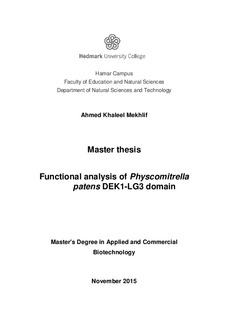Functional analysis of Physcomitrella patens DEK1-LG3 domain.
Master thesis
Permanent lenke
http://hdl.handle.net/11250/2402674Utgivelsesdato
2015Metadata
Vis full innførselSammendrag
The defective kernel 1 (dek1) is a highly conserved gene in land plants, encoding the single calpain in plants, which plays essential role in the development of both the epidermal cell layer in plant embryos and aleurone cell formation during seed development. The DEK1 protein comprises 21-23 transmembrane segments, a loop (DEK1-Loop) between transmembrane domains 9 and 10, a non-structured cytoplasmic arm (DEK1-Arm), and a highly conserved calpain domain composed of the CysPc-C2L domains. Recent unpublished bioinformatics study of the DEK1 protein shows that land plants DEK1-Arm sequences contain a domain homologous to the laminin globular 3 (LG3) domain. Our intention was to genetically investigate the function of the DEK1-LG3 domain in P. patens by using homologous recombination to precisely remove the genomic sequence corresponding to the LG3 domain. In order to achieve that, vector pBHRF_PpArm_ΔLG3 plasmid was designed to harbour the P. patens dek1 Arm-Δlg3 sequence. The plasmid was digested with restriction enzymes RsrII and PacI, and then transformed into the P. patens dek1-ΔArm mutant plant, thus creating the P. patens dek1-Δlg3 mutant. The P. patens dek1-Δlg3 mutant affected the gametophores development where the phyllids were small, missing marginal serration, have a blunt tip and short midrib. Deletion of the LG3 domain in P. patens DEK1 caused also failure in the opening of the apices, leaving the archegonia closed, and defect in the egg canal formation making the mutant plant sterile. The deletion of LG3 domain in the P. patens DEK1 may affects or regulates auxin biosynthesis, thus changing auxin concentration in the plant which leads to abnormality in both gametophore and gametangia development in the mutant plant.
Beskrivelse
Mastergradsoppgave i næringsrettet bioteknologi, Avdeling for lærerutdanning og naturvitenskap, Høgskolen i Hedmark, 2015. Master of applied and commercial biotechnology.
